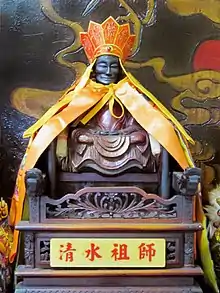Qingshui (monk)
Qingshui (Chinese: 清水; pinyin: Qīngshuǐ; Pe̍h-ōe-jī: Chheng-chúi; 1047-1101), also known as Chó͘-su-kong (Chinese: 祖師公; Pe̍h-ōe-jī: Chó͘-su-kong), born Chen Zhaoyin (Chinese: 陳昭應; Pe̍h-ōe-jī: Tân Chiau-èng) was a Chan Buddhist monk during the Northern Song from Anxi County, Quanzhou. He was said to have gained supernatural powers gained through his skill in speaking the dharma and meditation.[1] Through this, he is said to have saved the town of Anxi during a period of drought, bringing rain as he went from place to place. In reverence, the villagers built shrines to him and hence became a Deity in Chinese folk religion.[2]

Qingshui is also known by the following nicknames:[1]
- Dropping Nose Ancestor (Chinese: 落鼻祖師公; Pe̍h-ōe-jī: La̍k-phīⁿ chó͘-su-kong), known for the prominent nose featured in Qingshui's effigies
- Black Faced Ancestor (Chinese: 烏面祖師公; Pe̍h-ōe-jī: o͘-bīn-chó͘-su-kong)
Worship of Qingshui Zhushi is especially popular in Taiwan, where he is worshiped by local villagers for protection and in overseas Hokkien-speaking communities. His birthday is celebrated on the sixth day of the first lunar month.
Life
Qingshui Zhushi was born in 1047. He became a monk when he was young, and his early potential was recognized by the chief monk at the temple. When the chief monk passed away, Qingshui Zhushi became the next chief monk at the temple. He is credited with many famous quotes made during his lifetime.
Achievements
Below listed his achievements:
- building bridges- He helped build more than 10 different bridges around the towns.
- herb medicine creation- In china, there is a saying "When you save the life of one, it will even help you more than reaching heaven when you die." And he has learned about many different medical herbs. And his achievements in medicine are even on-par to those of professionals in that era.
- praying for rain- Normal people believe that there is no man that can control the weather, only a man of great spiritual cultivation will be able to achieve this. And when Qingshui Zhushi was alive, he performed numerous miracles in praying for rain during times of drought.
Worship

It is stated that all the devotees would worship Qingshui Zhushi by using fruit, cakes and other vegetarian food as offering items on the Deity's birthday (on the sixth day of first lunar month) every year to express their devotion and gratitude. And up till now, many worshippers will frequently visit His temples throughout the years to pray for His divine blessings and protections. Some also believe they will gain good blessings for the rest of the year after faithfully worshipped in His temples. God pigs are also a popular sacrifice at certain Qingshui Zhushi temples among the Hakka community in Taiwan.
Temples dedicated to Qingshui
| Wikimedia Commons has media related to Qingshui (god). |
- Qingshui Yan Temple: (清水岩), Anxi County, Quan Zhou, China
- Qingshui Temple: (艋舺清水巖), Wanhua, Taipei, Taiwan
- Zushi Temple: (三峽長福巖), New Taipei, Taiwan
- Qing Shui Temple: (清水宮), Zuoying, Kaohsiung, Taiwan
- Chin Swee Caves Temple: (清水岩庙), Genting Highlands, Malaysia
- Snake Temple: Penang, Malaysia
- Fushan Temple: (福山寺), Yangon, Myanmar
- Saw Si Gone Temple: Mawlamyine, Myanmar
- Hock Guan Kong Temple: Phuket, Thailand
- Shun Heng Keng: Bangkok, Thailand
- Chaweng d Jo Su Jui Kong Shrine: Krabi, Thailand
- Hong Lai Sze: (蓬莱寺), Hougang, Singapore
- Peng Lai Dian: (蓬莱殿), Admiralty Street, Singapore
- Long Xu Yan Temple: (龙须岩金水馆), Ang Mo Kio, Singapore
- Ching Chwee Temple: (清水庙东圣殿), Woodlands, Singapore
References
- Tan, Chee Beng (2006). Southern Fujian: reproduction of traditions in Post-Mao China. Chinese University of Hong Kong. p. 125. ISBN 9789629962333.
- "Chin Swee Caves Temple - The Founder". chinswee.org. Retrieved 2021-01-03.